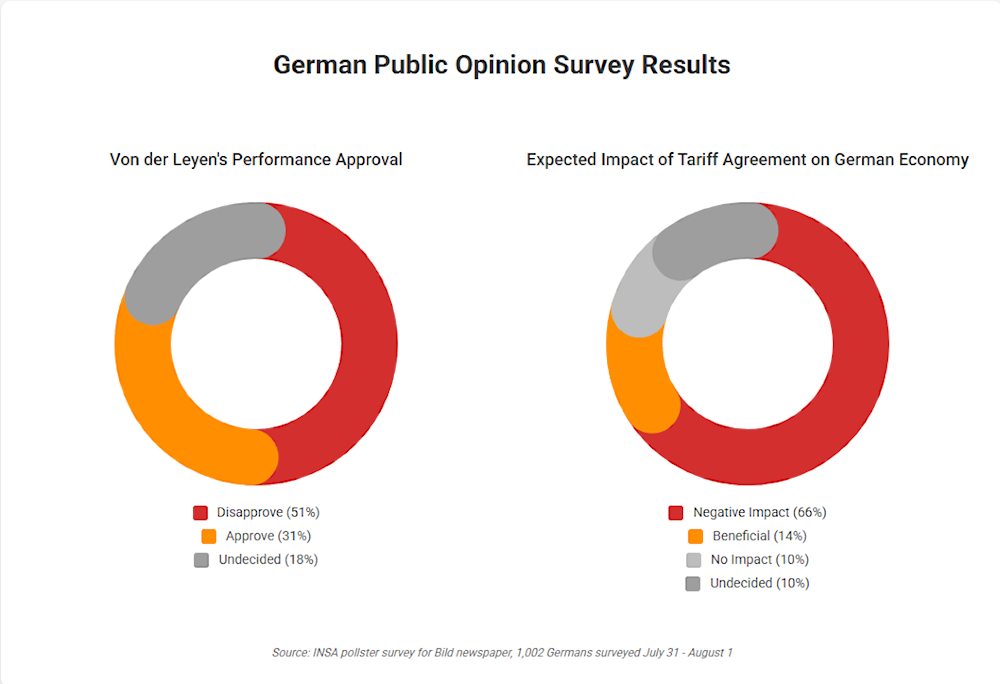Majority of Germans disapprove of von der Leyen role in US-EU deal
A recent INSA poll shows over half of Germans disapprove of European Commission President Ursula von der Leyen's performance, following the announcement of an EU-US tariff deal.
-

US President Donald Trump and European Commission President Ursula von der Leyen shake hands after reaching a trade deal at the Trump Turnberry golf course in Turnberry, Scotland Sunday, July 27, 2025. (AP Photo/Jacquelyn Martin)
A majority of Germans are displeased with European Commission President Ursula von der Leyen's handling of her role, particularly after the announcement of the new EU-US tariff deal.
Based on a survey conducted by the INSA pollster for the Bild newspaper, 51% of 1,002 Germans surveyed from July 31 to August 1 disapprove of von der Leyen’s performance. In contrast, 31% expressed approval, while 18% remained undecided.
The poll further revealed that 66% of respondents believe the tariff agreement will negatively impact the German economy. Only 14% said it would be beneficial, and 10% expected no impact.
-

German public opinion survery results (produced by Al Mayadeen English)
Economic concerns over EU-US trade agreement
On July 27, von der Leyen and US President Donald Trump reached a trade agreement at Trump’s Scottish golf resort. The deal imposes a 15% tariff on most EU exports to the US, impacting goods worth approximately €380 billion. The agreement avoided a threatened escalation to 30% tariffs but still marked a substantial realignment of transatlantic trade relations.
- About 70% of EU exports to the US will face a 15% tariff.
- Zero tariffs remain on select strategic products such as aircraft parts and certain chemicals.
- 50% tariffs persist on steel, aluminum, and copper, albeit under a quota system.
- The EU pledged to purchase $750 billion worth of US energy over three years and invest $600 billion in the US by 2028.
Predicted impact on the EU economy
The 15% tariff is expected to cut EU GDP by approximately 0.3% to 0.5%. Export volumes to the US may fall by up to 1.1%, a relatively modest decline. However, sectors like automotive and pharmaceuticals are facing serious uncertainties. The recent appreciation of the euro against the dollar further exacerbates export competitiveness as European products become more expensive to US consumers.
The automotive sector is particularly exposed despite a tariff reduction from 27.5% to 15%. The German Association of the Automotive Industry warns of billions in annual losses. The pharmaceutical industry faces regulatory ambiguity, while the aerospace industry remains comparatively shielded.
Germany bears the brunt
As the EU’s largest exporter to the US, Germany is particularly affected. In 2024, it exported €161.2 billion in goods to the US. The German central bank estimates that the new tariffs could slash the country's GDP by up to 1.0%. Chancellor Friedrich Merz acknowledged that while the deal averted a more severe scenario, further trade liberalization is preferred.
EU political reactions
Political responses across the EU have been sharply divided. France has condemned the deal in strong terms, with Prime Minister François Bayrou calling it "a dark day" for the EU and President Emmanuel Macron criticizing Europe's weak negotiating stance. In Hungary, Prime Minister Viktor Orbán declared that Trump had "devoured Ursula von der Leyen for breakfast."
In contrast, Germany and Italy have offered cautious support, viewing the agreement as a necessary compromise to avoid broader economic conflict. Italian trade groups, however, have voiced discontent, framing the agreement as capitulation. Ireland, highly dependent on US trade, is concerned about the pharmaceutical sector’s vulnerability under the deal.
A new trade deal between the #US and #EU, sealed by US President #DonaldTrump and EU Commission President Ursula von der Leyen, has ignited fury across #Europe, with top officials calling it a disaster for the bloc. pic.twitter.com/hk5lDhpTVP
— Al Mayadeen English (@MayadeenEnglish) July 30, 2025

 3 Min Read
3 Min Read








